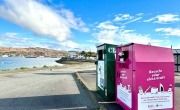Cheshire East Council secures funding for hydrogen refuse vehicles
Cheshire East Council has partnered with renewable energy company Storengy to secure funding towards a £1-million hydrogen refuse vehicle scheme.

With funds from both public and private sector money, including a £345,000 contribution from the local enterprise partnership’s Local Growth Fund, the scheme will allow for the installation of a green hydrogen fuelling facility at the Ansa environmental services depot in Middlewich – the first of its kind in the north west of England.
The new facility will use an electrolyser connected to solar panels and grey-water recycling to provide hydrogen fuel which will be pumped into dual-fuel refuse collection vehicles (RCVs).
Initially, two council-owned vehicles and one owned by Storengey will be converted to use the hydrogen fuel, reducing diesel use by more than 10,000 litres per year. The refuse vehicles will be operating from autumn 2020, subject to approvals, such as planning permission.
After declaring a climate emergency in May 2019, Cheshire East Council will use this funding to support its goal for carbon neutrality by 2025. Councillor Nick Mannion, Cheshire East Council cabinet member for environment and regeneration, explained: “This scheme is an exciting step towards the council becoming carbon neutral by 2025. Through our environmental strategy, we intend to lead the way in green initiatives like this.
“Building a cleaner, greener economy will not only reduce carbon but also create jobs across the borough through new and innovative technologies, such as hydrogen.
“Hydrogen is ideal as an alternative to diesel for our refuse vehicles. These wagons have heavy schedules when delivering their services across the borough and this type of refuelling will ensure they have cleaner power they need when emptying our residents’ bins.”
Councillor Quentin Abel, Cheshire East Council’s climate change champion, added: “Policymakers and industry widely acknowledge that to achieve a zero-carbon economy we need to use fuels like hydrogen as a green energy source. This scheme means we can take that first step, starting with our heavy-duty vehicles. This will help towards combating this increasing climate change crisis.”
Mike Gibson, Managing Director of Storengy, said: “Decarbonising fleet operators’ activities is a huge challenge and we see this as an important first step in the process.
“We pride ourselves on being part of the energy transition that harnesses a fresh approach to deliver and store energy sources in the UK and worldwide. We are delighted to unveil this scheme in partnership with Cheshire East Council, the first of its kind in the United Kingdom.”
Decarbonising waste collection
As local authorities up and down the country look for ways to address the climate emergency, cutting down RCV fuel use will be a necessary step in reducing the greenhouse gas emissions associated with waste collection.
Several councils are making the switch from diesel to electric RCVs, with the City of London aiming to become the first UK local authority to run a fully electric fleet and several other local authorities, including Sheffield and Westminster, also trialling electric vehicles.
A recent report from Eunomia Research and Consulting claimed that switching the UK’s diesel-powered RCVs for electric trucks could reduce emissions by 290,000 tonnes of CO2 each year, equivalent to every person in the UK recycling an extra 250 plastic bottles a year.
Whilst the report does consider other technologies, including biodiesel, CNG, biogas and hydrogen, Eunomia concludes that electric RCVs are the best option, providing significant air quality and CO2 emissions advantages over vehicles that rely on the combustion of hydrogen.
However, although most hydrogen is currently generated by steam reforming of natural gas, relying indirectly on fossil fuel production, Eunomia’s report explains that hydrogen fuel may become increasingly viable in the future as it improves in efficiency, cost-effectiveness and availability.
Cheshire East residents can find out more about the new scheme by contacting their local councillors via the council’s website. 








